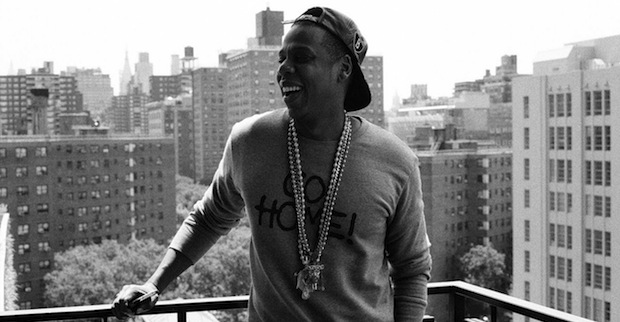
Hip hop legend Jay-Z used a commercial break during last night’s NBA Finals game to announce his modestly titled new album, Magna Carta Holy Grail. The news came as a pleasant surprise to fans around the globe who wondered what would follow April’s “Open Letter,” but it’s how the album is coming out that has many still talking this afternoon.
As part of a promotional deal with Samsung, one million copies of Jay-Z’s new album will be made available exclusively to owners of Samsung Galaxy devices (for free) on July 4, a full 72 hours before the album’s release to the general public. Those wishing to claim a copy of the album will need to download a yet-to-be-released app designed specifically for the launch, and then use that app to claim one of the million downloads starting at 12:00 AM on July 4. There is no guarantee downloading the app will get you the album, of course, but it does guarantee you’ll interact quite a bit with Jay-Z’s brand and the latest Samsung technology.
There are quite a few questions posed by this move from Jay-Z, starting with whether or not those million albums should count toward platinum certification. Neilsen Soundscan, the company which measures album sales and awards such certifications, have yet to comment on the situation. The Wall Street Journal reveals Samsung did in fact buy the downloads for $5/ea (netting Jay-Z a cool $5 million for those of you too lazy to do the math), but if those downloads were to be recognized as legitimate sales towards future certification, what type of precedent would be set for future releases? The success of an album’s sales should be based on how the public reacts to that artist’s newest offering, not how much a corporation is willing to invest in said artist. I have no doubt that people will claim the million downloads, thus creating a future argument that those albums would have been sold regardless, but until those consumers weigh in and say they would in fact have bought the record on their own volition, there is no proof. As it stands now, a million copies of an album no one has heard are waiting to be given away for free. There may be demand to hear that product, but that doesn’t mean a million people with Samsung phones are so excited for Jay-Z’s new album that they would buy it the week it came out based on blind faith in his talent.
Another question raised by the Jay-Z partnership with Samsung is what the move says about how Jay views his own artistic output. Putting the distribution of his latest creation into the hands of a corporation who will market it for their own benefit puts a new spin on the argument of whether or not art is creative output for the sake of entertainment or simply an advertising vehicle for a brand (or in this case, brands). By inking this contract, Jay-Z made $5 million on his art without having to interact or engage with his fans in the slightest, but in doing so he also built a wall to divide those fans based on something as trivial as which type of cell phone they have in their pocket. He’s completely removed the consumer from the economic equation, and in doing so eliminated any need to care whether or not they enjoy the music he has created. Some might see that as freedom, but what point outside of financial gain is there to release art if your main focus is not entertaining and/or reaching as many people as possible with your creation? If the album comes out and people hate it, Jay may learn a lesson on future releases, but for now he’s sitting on a ‘hit’ without earning such acclaim.
What about the 72 hour span between the midnight album launch on July 4 and the general public street date? Aside from adding to the aforementioned divide this whole deal creates amongst fans, this exclusivity period leaves Magna Carta Holy Grail wide open for piracy. It will take less than an hour for users to gain access to the album, which means it will probably only be a matter of hours before a leak of the full album arrives online. Even if that first leak is low quality, it will be more than enough for most to at least make up their mind about further pursuing the album when it hits stores. If the leak quality is high, and in a world where even Yeezus leaks in CD quality I do believe it is possible, many may be satisfied enough with a rip that they never purchase the actual release. If Samsung Galaxy users get it for free, why can’t they? Oh, that’s right. Because a major corporation isn’t footing the bill.
Regardless of how you feel about the questions posed above, it’s clear Jay-Z’s deal with Samsung has ushered in the beginning of a new era of artist and brand relationships. People can cry foul all they want, but as it stands, the success of Magna Carta Holy Grail has seemingly been set in stone. Even if people oppose the partnership, every hip hop fan wants that Jay-Z album and most will do whatever they have to in order to hear it as soon as possible, including promoting Samsung products endlessly for the next two weeks. I remain as excited as any Jay-Z fan could be at the promise of new music, but it’s hard to not question the motives behind the release when it seems like getting it to the people who support you takes a backseat to maximizing profits.
Written by: James Shotwell (Twitter)
- 2015’s Most Underrated Films - December 29, 2015
- Passing The Torch: The End Of An Era For UTG - December 1, 2015
- UTG PREMIERE: Before The Streetlights – “Private Browser” - November 26, 2015

All I have to say is: http://www.buzzfeed.com/hunterschwarz/11-times-jay-z-used-a-phone-that-wasnt-a-samsung-galaxy